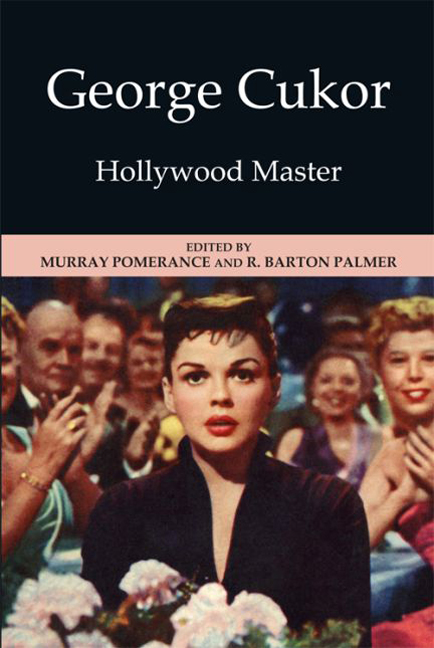Book contents
- Frontmatter
- Contents
- List of Figures
- List of Contributors
- Acknowledgments
- Introduction
- 1 Cukor's Tragicomedies of Marriage: Dinner at Eight, No More Ladies, The Women, and The Marrying Kind
- 2 George Cukor's Late Style: Justine, Travels With My Aunt, and Rich and Famous
- 3 Libel, Scandal, and Bad Big Names: It Should Happen to You, Les Girls, Camille, and Romeo and Juliet
- 4 The Cukor “Problem”: David Copperfield, Holiday, and The Philadelphia Story
- 5 Modulations of the Shot: The Quiet Film Style of George Cukor in What Price Hollywood?, Born Yesterday, Sylvia Scarlett, and My Fair Lady
- 6 Doubling in the Cinema of George Cukor: The Royal Family of Broadway, A Bill of Divorcement, A Double Life, and Bhowani Junction
- 7 George Cukor and the Case of an Actor's Director: Hepburn and/or Tracy in Little Women, The Actress, Keeper of the Flame, Adam's Rib, and Pat and Mike
- 8 Cukor Maudit: Tarnished Lady, Girls About Town, Our Betters, Susan and God, Desire Me, Edward, My Son, The Model and the Marriage Broker, Let's Make Love, and The Chapman Report
- 9 George Cukor's Theatrical Feminism: Gaslight, Heller in Pink Tights, A Life of Her Own, and A Star is Born
- 10 The Furthest Side of Paradise: Two-Faced Woman, A Woman's Face, Hot Spell, Wild is the Wind, and Winged Victory
- Works Cited and Consulted
- Index
10 - The Furthest Side of Paradise: Two-Faced Woman, A Woman's Face, Hot Spell, Wild is the Wind, and Winged Victory
Published online by Cambridge University Press: 07 October 2017
- Frontmatter
- Contents
- List of Figures
- List of Contributors
- Acknowledgments
- Introduction
- 1 Cukor's Tragicomedies of Marriage: Dinner at Eight, No More Ladies, The Women, and The Marrying Kind
- 2 George Cukor's Late Style: Justine, Travels With My Aunt, and Rich and Famous
- 3 Libel, Scandal, and Bad Big Names: It Should Happen to You, Les Girls, Camille, and Romeo and Juliet
- 4 The Cukor “Problem”: David Copperfield, Holiday, and The Philadelphia Story
- 5 Modulations of the Shot: The Quiet Film Style of George Cukor in What Price Hollywood?, Born Yesterday, Sylvia Scarlett, and My Fair Lady
- 6 Doubling in the Cinema of George Cukor: The Royal Family of Broadway, A Bill of Divorcement, A Double Life, and Bhowani Junction
- 7 George Cukor and the Case of an Actor's Director: Hepburn and/or Tracy in Little Women, The Actress, Keeper of the Flame, Adam's Rib, and Pat and Mike
- 8 Cukor Maudit: Tarnished Lady, Girls About Town, Our Betters, Susan and God, Desire Me, Edward, My Son, The Model and the Marriage Broker, Let's Make Love, and The Chapman Report
- 9 George Cukor's Theatrical Feminism: Gaslight, Heller in Pink Tights, A Life of Her Own, and A Star is Born
- 10 The Furthest Side of Paradise: Two-Faced Woman, A Woman's Face, Hot Spell, Wild is the Wind, and Winged Victory
- Works Cited and Consulted
- Index
Summary
“Usually, when you make a picture that doesn't turn out well, it's happily buried,” reminisced George Cukor to Gavin Lambert, undoubtedly expressing a view shared by many of his classic studio era colleagues (122). The unpleasantness of last season's critical disaster could be, and often was, effaced by this month's box-office success. An industry devoted to the never ending, sometimes frantic turning out of a product that came and went quickly offered many opportuni¬ties for self-reclamation, even as, of course, the volume of production and the complex forms of collaboration on which it depended insured that there would be missteps as well. Television changed that, Cukor sadly observed, because what you did years ago keeps “popping up and you may be confronted with your past failures” (122). An oeuvre (if one thinks about one's career in this expressively collective fashion) becomes available for evaluation through various forms of re-screening, and this, so Cukor suggests, might not always be a cause for celebration.
An Unexpected Failure: Two-Faced Woman
Cukor's meditations on projects that don't “turn out well” were prompted by Lambert's mention of Two-Faced Woman (1941), a film that upon initial release earned a “C” from the Legion of Decency reviewers, thereby prompting a boycott from observant Catholics. Despite this notoriety, often box-office enhancing (see Howard Hughes and The Outlaw [1943]) never connected with audiences when Two-Faced Woman was reissued in a slightly less suggestive, but still rather naughty, form. Two-Faced Woman, as it turns out, was Greta Garbo's last film, and that meant Cukor had to suffer the further indignity (if that is what it was) of his work being exhibited at festivals in the actress's honor. Was he to blame in some way for Garbo's decision to retire? The film did, in effect, end her career, and so the question was perhaps inevitable. Metro terminated Garbo's contract in the wake of the film's dismal reviews and pitiful box-office earnings. Had Cukor somehow managed to drain from her image what appeal she still had, through his ineffective coaching of her limited gifts for comedy? No wonder that Cukor, who had such success directing her in Camille (1936), inevitably inviting comparisons, would have liked the film to be forgotten.
- Type
- Chapter
- Information
- George CukorHollywood Master, pp. 156 - 172Publisher: Edinburgh University PressPrint publication year: 2015



